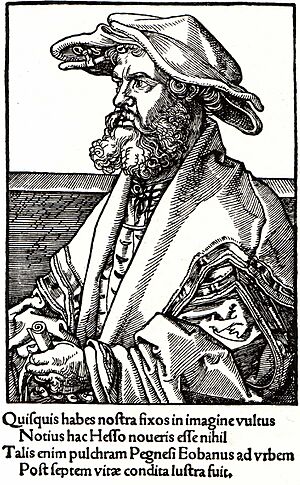Helius Eobanus Hessus facts for kids
Helius Eobanus Hessus (born January 6, 1488 – died October 5, 1540) was a famous German poet who wrote in Latin. He later became a supporter of the Reformation and a humanist, someone who believed in the importance of human values and reason. He was born in a place called Halgehausen in Hesse-Kassel.
Contents
Helius Eobanus Hessus: A German Poet's Life
His family name might have been Koch. The name Eoban came from a local saint, and Hessus showed he was from Hesse. Helius meant he was born on a Sunday.
Early Life and Education
Hessus went to a Latin school in Frankenberg, Hesse. His teacher and guide was Ludwig Stippius. Stippius was a close friend of Martin Luther, a key figure in the Reformation. Hessus even dedicated his first poem, called an idyl, to Stippius in 1509.
In 1504, Hessus started studying at the university of Erfurt. After he graduated, he became the rector (head) of the school of St Severus. He did not keep this job for long. From 1509 to 1513, he spent his time at the court of the bishop of Riesenburg.
Challenges and New Beginnings
When he returned to Erfurt, Hessus faced many difficulties. However, in 1517, he was appointed a professor of Latin at the university. He became connected with many important people of his time. These included Johann Reuchlin, Konrad Peutinger, Ulrich von Hutten, and Konrad Mutianus.
Hessus was involved in the political, religious, and literary discussions of the period. He eventually decided to support Martin Luther and the Reformation. He remained a supporter of the Reformation for the rest of his life.
Moving On and Final Years
The university in Erfurt became less popular as the new University of Wittenberg grew. Hessus tried to earn a living by practicing medicine, but he was not successful.
With help from Camerarius and Melanchthon, he found a job in Nuremberg in 1526. But he did not like a very structured life, so he went back to Erfurt in 1533. However, Erfurt had changed. His old friends were gone, and the university was almost empty.
A long poem he wrote gained him the favor of the Landgrave of Hesse. In 1536, the Landgrave invited him to be a professor of poetry and history in Marburg. Hessus died there in 1540.
Hessus's Literary Contributions
Hessus was considered the best Latin poet of his time. He was good at writing verses, but some thought he was not a "true" poet. He often wrote what he thought would be popular or would please important people.
He wrote poems about local places, history, and military events. He also wrote idylls (short poems about country life), epigrams (short, witty poems), and other pieces. These were collected in a work called Sylvae.
Popular Works and Translations
His most popular works were his translations of the Psalms into Latin distichs (two-line verses). These translations were printed over fifty times! He also translated the Iliad, a famous Greek epic poem, into Latin hexameters (a type of poetic meter).
Original Poetry
His most original poem was the Heroides. This work was inspired by the Roman poet Ovid. It contained letters from holy women, starting with the Virgin Mary and including figures like Kunigunde, who was the wife of Emperor Henry II.
Legacy and Further Information
His friend Camerarius edited his Epistolae (letters) and also wrote a book about his life in 1553. Other people have written about him since then, including M. Hertz (1860), G. Schwertzell (1874), and C. Krause (1879). You can also find information in D. F. Strauss's book, Ulrich von Hutten (1874).
His poems about Nuremberg and other towns have been published with notes and illustrations from the 1500s. These were put together by J. Neff and V. von Loga in a collection called Lateinische Literaturdenkmäler des XV. u. XVI. Jahrhunderts (Berlin, 1896).
 | George Robert Carruthers |
 | Patricia Bath |
 | Jan Ernst Matzeliger |
 | Alexander Miles |


